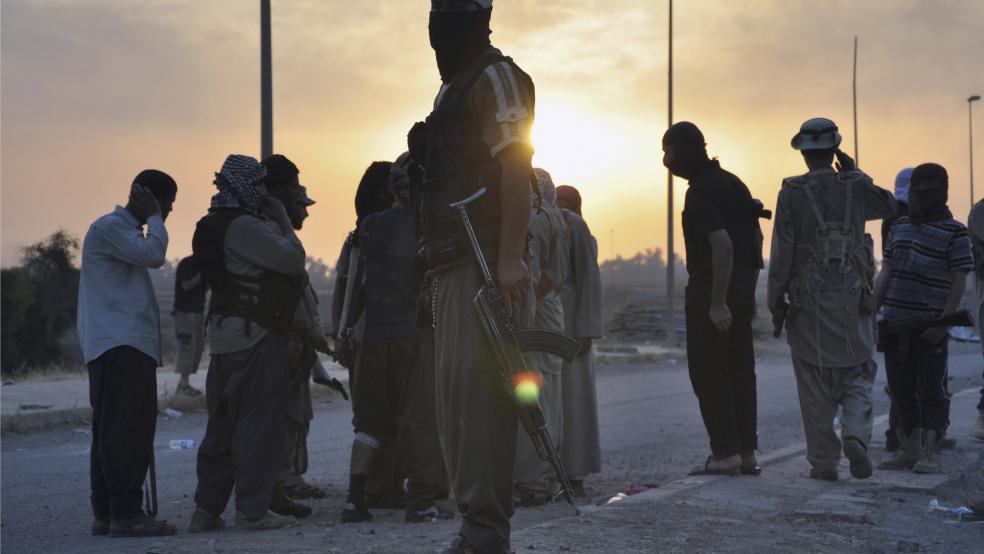The Obama administration’s plan to beat back ISIS has been relatively simple from the start: The U.S. was to train, arm, advise and provide air cover for national and moderate forces on the ground in Iraq and Syria. In Iraq, that means the U.S. has relied— and continues to rely on — Iraqi government forces, local Sunni tribes and the Kurdish Peshmerga. In Syria, the administration’s hopes rested on selected factions of the Free Syrian Army.
But the battles of recent weeks have proved that most of these forces are not reliable. In Iraq, the Sunni tribes and the Iraqi government lost the city of Ramadi, the capital of Anbar province to the west of Baghdad. In Syria, the moderate factions of the Free Syrian Army no longer exist or are inactive. Instead, a string of victories by ISIS and allied groups in Iraq and Syria has shown that Obama's plan to “degrade and ultimately defeat” these extremist groups has utterly collapsed.
Related: The Taking of Ramadi: Behind ISIS's Bloody Assault
The reason for that failure is clear, and should have been predictable: In the war against ISIS, as in much of the Middle East, identity politics trumps all. While the Obama administration was hoping that its surrogate forces would operate according to a unified national agenda, another process was taking place — and happening faster. Roughly a century after Iraq’s current borders were drawn in the wake of World War I, the combination of decades of sectarian dictatorship, the Iraq War and the Arab Spring has led to a growing disillusionment with the concept of national states and a rapid polarization of sectarian and ethnic aspirations. The result is that the active forces on the ground in both Iraq and Syria are those with sectarian and ethnic agendas, not national ones. Sunni, Shiite or Kurd takes priority over Iraqi or Syrian.
What Obama and his advisors have yet to understand is how deeply ingrained tribalism is in both the culture and the religion of Muslims. Ironically, Muhammad united the warring tribes as a community of believers in God and the Qur’an, Philip Carl Salzman, author of Culture and Conflict in the Middle East explained in Middle East Quarterly. Over time, this unity evolved into Islam against the infidels and gave rise to jihad.
The Obama administration was hoping that these forces would fight well and operate in a unified manner, not a sectarian one. That didn't happen. It was expected that the Sunni tribes would lead the fight against ISIS while Iraqi government forces supported them and suppressed the Shiite militias. That didn't happen, either. Both the Sunni tribes and the Iraqi government forces collapsed while fighting ISIS.
Related: Why a Military Victory Over ISIS Is Wishful Thinking
In Syria, the Obama's administration's plan to train 5,000 Free Syrian Army soldiers hasn’t even started yet. Instead, some of the factions of the Free Syrian Army that were chosen to be trained are fighting alongside al-Qaeda against the Syrian regime. The failure to provide stronger support for the Free Syrian Army in 2012 allowed Syrian rebel groups to be coopted by Islamist and jihadi forces and eventually led to a radicalization of fighters within the armed groups, says Phillip Smyth, a researcher on Middle Eastern affairs at the University of Maryland.
The results have been dismal:
- In Iraq, after 18 months of fighting, ISIS captured Ramadi. Iraqi government forces fled the city in a humiliating manner. It was ISIS's most significant victory since the summer of 2014, when the militants captured Mosul, Iraq's second largest city, and the provincial capital of Tikrit.
- After a continuous battle that lasted for a year, ISIS also took control of most of the Baiji oil refinery to the north of Baghdad. This refinery is Iraq's largest. Both ISIS and the Iraqi government fought for it more ferociously more than for any other spot in the country.
- In Syria, a new alliance that was formed a few months ago is gaining momentum in the northwest of the country. This alliance includes the Nusra Front, al-Qaeda's branch in Syria. Two months ago, this alliance captured the provincial capital of Idlib.
- Finally, just days after capturing Ramadi, ISIS captured the ancient city of Palmyra, considered one of the most important archeological sites in the Middle East. With that new victory, ISIS now controls half the territory in Syria.
“The current Middle East situation in general, and the ISIS-dominated space of Iraq and Syria in particular, provides irrefutable evidence that President Obama's strategy has failed miserably,” says David Allen Scholl, the deputy director of security services of Nations Secure, who spent eight years in Iraq advising the U.S. Army, the State Department and the Iraqi military intelligence.
Now, the most active anti-ISIS forces in Iraq are Iranian-backed Shiite militias, motivated by a sectarian drive to defend themselves against the Sunni extremists of ISIS. The Kurds have also been an effective fighting force in both Iraq and Syria. In their case, ethnic differences have motivated them to fight against the Arabs of ISIS. The factions of the Sunni Free Syrian Army fight better against the Alawite Syrian government forces than against the Sunni ISIS. Iraqi Shiite men fought better within the Shiite militias than in the Iraqi army.
With the Shiite militias being the only reliable ground force in Iraq, the Obama administration has swallowed all its objections to dealing with them, opening the way for them to lead the effort to liberate Ramadi.
The reliance on those militias carries serious risk. “If you use Shiite militias to fight ISIS, it is like putting oil on the fire, motivating and strengthening ISIS because of the big religious sectarian Sunni-Shia conflict in the region,” says retired Lebanese Brigadier General Tannous Mouawad, now the general manager of political and military consultancy Middle East Studies LTD. He adds that Iran is trying to replace traditional armies with Shiite militias in Syria, Iraq and Lebanon.
“As the events are unfolding, it is very important to acknowledge that the identity based politics will prevail for decades,” says Elie Abouaoun, director of Middle East programs at the United States Institute of Peace. “Denial is not the remedy to the situation.”
Top Reads from The Fiscal Times:





